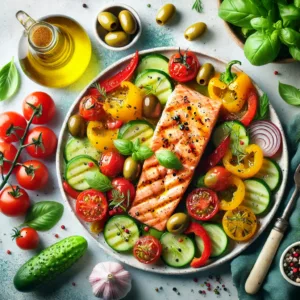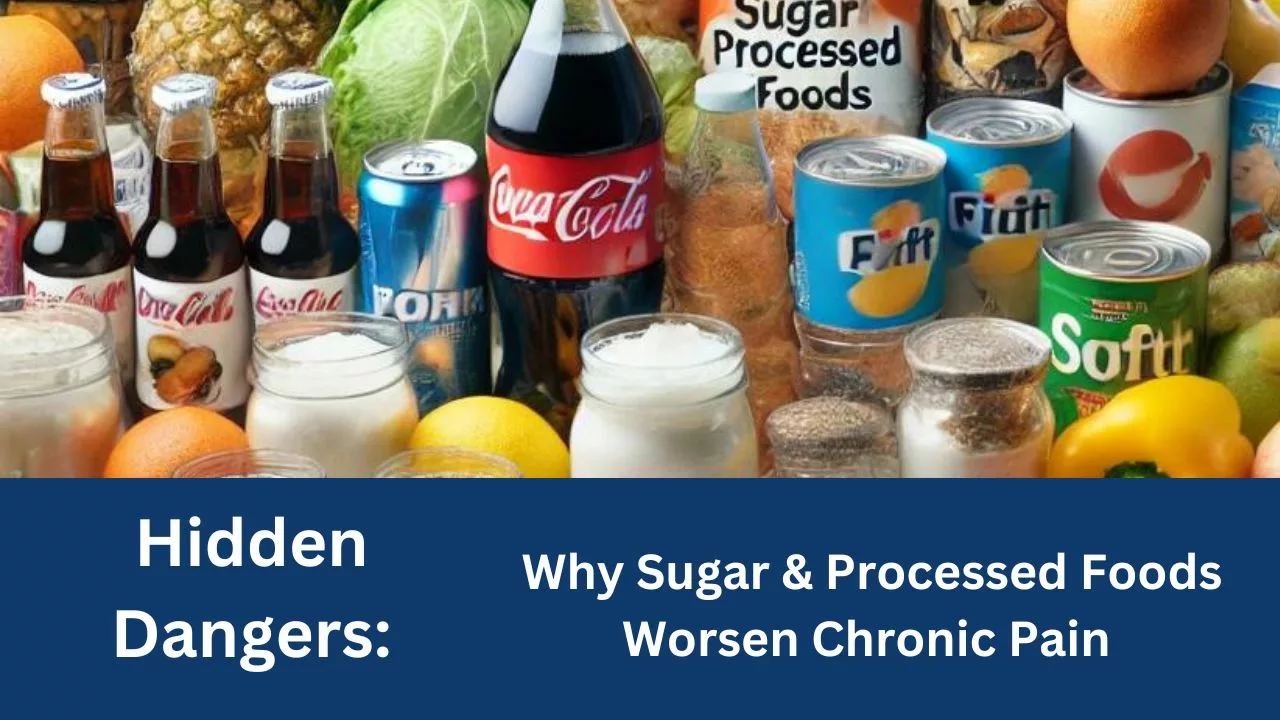
You may not think twice when reaching for that sugary snack or fast food meal, but what if those cravings were silently fueling your chronic pain? That sugary snack or convenient fast food meal may seem harmless in the moment—but could they actually be fueling your chronic pain? Studies now show a strong link between chronic pain and processed foods, especially sugar. These hidden ingredients increase inflammation and intensify your body’s pain response. If you’re ready to reduce your pain and feel more energized, it’s time to uncover the real cost of sugar and processed foods—and how simple changes can lead to lasting relief.
Inflammation and Chronic Pain: What’s the Real Connection?
Inflammation and chronic pain go hand in hand. But what’s surprising is how much chronic pain and processed foods and sugars play a role in this relationship. Consuming a high-sugar diet can ignite a firestorm of inflammation in the body, making pain worse. According to Harvard Health, certain foods—especially those high in sugar or refined carbs—can trigger inflammation that worsens chronic pain.
Scientific studies have shown that sugar spikes can lead to increased levels of inflammatory markers. These markers, like CRP (C-reactive protein), are clear indicators that your body is fighting off something, often leading to more pain. 
Here’s how it works: When you eat sugar, your body releases a burst of insulin to manage blood sugar levels. This sudden spike and subsequent drop disrupt your body’s natural balance, flipping the inflammation switch on and off. Over time, this process heightens your body’s pain response, making chronic pain harder to manage.
Real-Life Example: Take James, for example. A long-time chronic back pain sufferer, James noticed a significant drop in his pain levels after cutting out sugary snacks and sodas. His experience is far from unique—many people who reduce sugar intake report a noticeable decrease in pain.
Processed Foods and Pain: What You Need to Know
Processed foods are everywhere— unfortunately, they’re convenient, super yummy, and (buyer beware) often marketed as healthy. However, these foods are packed with additives, unhealthy fats, and preservatives that can wreak havoc on your body, leading to chronic inflammation and worsening pain.
Processed foods typically contain trans fats, refined carbs, and artificial additives that trigger inflammation. For example, trans fats found in baked goods and fast food can increase inflammatory responses in your joints, while refined sugars intensify this reaction. Imagine eating something that causes your body to react as if it’s under attack all the time. 
Real-Life Example: Consider Melissa, who struggled with fibromyalgia. Relying on processed foods for quick meals, she didn’t realize these foods were exacerbating her pain. After switching to whole, unprocessed foods, she saw a remarkable reduction in her pain levels.
The reality is, it’s not just about avoiding processed items but also understanding what you’re eating. Reading labels, cutting down on fast food, and choosing fresh ingredients over pre-packaged options can lead to a significant reduction in chronic pain.
Surprising Benefits of Cutting Sugar and Processed Foods
The benefits of reducing sugar and processed foods go far beyond managing cravings—they can transform your overall health. When you cut back on these inflammatory culprits, you’re giving your body the tools to heal and thrive. The payoff is huge!
In the short term, you may notice immediate changes like improved energy levels and a more stable mood. No more sugar highs and crashes means your body can maintain a steady balance, leaving you feeling better overall.
In the long term, reducing sugar and processed foods leads to lower levels of inflammation and less pain. People who make these dietary changes often report more restful sleep, clearer skin, and better digestion.
Success Story: Take Alex, who decided to cut out sugary snacks and microwave meals. Within just a few weeks, he felt less joint pain and had more energy to get through his day. Real-life stories like this highlight how life-changing small dietary shifts can be.
Practical Tips for a Low-Inflammation Diet
Switching to a more anti-inflammatory diet doesn’t have to be overwhelming. Here are some simple strategies to get started:
- Make Small Swaps: Replace sugary breakfasts with protein-rich options like eggs or Greek yogurt. Try fresh fruit instead of sugary snacks or candy.
- Read Labels: Processed foods often hide sugars and additives in plain sight. Check labels for trans fats, high fructose corn syrup, and other inflammatory ingredients.

- Go for Whole Foods: Fill your plate with fruits, vegetables, lean proteins, and whole grains. These foods provide the nutrients your body needs without the harmful additives.
- Hydrate Well: Drinking water helps flush out toxins and keep your body functioning smoothly. Aim for at least eight glasses a day, and consider herbal teas like ginger or turmeric for added anti-inflammatory benefits.
By taking small, manageable steps, you can start reducing inflammation and improving your pain management without feeling overwhelmed.
Don’t Forget: Movement, Hydration, and Support Matter
Dietary changes are just one piece of the puzzle. Incorporating regular exercise into your routine can further reduce inflammation and help manage chronic pain. Whether it’s a brisk walk, yoga, or swimming, moving your body is key to keeping inflammation in check.
Don’t forget the importance of hydration. Drinking plenty of water helps your body flush out toxins and aids in reducing inflammation. Add a slice of lemon or some cucumber to your water for a refreshing boost. 
Finally, surround yourself with support. Join online groups or find communities where you can share recipes, tips, and success stories. Having people to lean on during your journey can make the changes more enjoyable and sustainable.
Final Thoughts
Reducing your intake of sugar and processed foods may seem like a small step, but it has the power to dramatically reduce inflammation and chronic pain. Understanding the link between chronic pain and processed foods is key to making better dietary choices that reduce inflammation. By understanding the hidden dangers these foods pose, you can make more better choices to support your overall health and well-being.
Your journey to a pain-free life doesn’t happen overnight, but with small, consistent changes in your diet, the results will come. Start today—your body will thank you.
About the Author
Courtney Woolfolk is a retired registered nurse and the founder of Wellness Wave HQ. She combines medical experience and personal passion to help others manage chronic pain through lifestyle and wellness strategies.
JOIN THE COMMUNITY!


Hi,
This is a great reminder of proper diet in managing chronic pain. I do not suffer from chronic pain, but I know that I feel better if I don’t eat processed food.
My big habit is drinking diet coke. My daughter and my wife tell me I need to stop. It’s always been something I enjoy, so it’s been difficult to cut out, although I have tried. I guess it can really be addicting. I also love chocolate, so that’s a difficult one as well.
I was read a book about the dangers of today’s wheat and grains and the inflammation it causes in the brain and body. Would you consider many breads to be a “processed food”? I know it’s high on carbs and can raise sugar levels.
– Scott
Hi Scott,
Thank you so much for your thoughtful comment! It’s great to hear that you’re already aware of the benefits of cutting out processed foods, even though you’re not dealing with chronic pain. You’re absolutely right—what we eat can make a big difference in how we feel, not just for managing pain but as we age and face those everyday aches and pains that tend to come with getting older.
As for diet soda, it can definitely be a tough one to quit, especially since it’s often an ingrained habit. While it’s marketed as a healthier alternative to sugary drinks, the artificial sweeteners in diet sodas can still lead to inflammation and other potential health risks. It’s understandable that your family is encouraging you to cut back, but like any habit, it’s often best to take it one step at a time, replacing it with healthier options like flavored water or herbal teas that can still give you that ‘refreshing’ feeling.
Chocolate can be tricky too! Dark chocolate, especially when it’s low in sugar, can actually have some health benefits in moderation. The key is just keeping an eye on how much you’re consuming and choosing higher quality, less processed options when possible.
Regarding your question about bread, you’re absolutely on point. Many breads, particularly white or refined types, can be considered processed foods. They often contain additives, preservatives, and refined sugars that can spike blood sugar levels and increase inflammation in the body. Opting for whole grain or sprouted grain bread can be a better option if you’re looking to minimize those effects, but even then, moderation is key, especially if you’re trying to manage inflammation.
I also agree with what you mentioned about wheat and grains. Some people, especially those with sensitivities, find that cutting back on modern wheat products reduces inflammation, particularly in the gut and brain. If you’re exploring that, you may want to try swapping out conventional bread with grain-free alternatives or even experimenting with foods like quinoa or sweet potatoes, which provide healthy carbs without the inflammatory impact.
It’s clear that you’re mindful of your diet, and that’s such a great step! Your journey can be about finding balance, and even small changes—like cutting back on diet coke or choosing healthier bread options—can have a big impact over time.
Thanks again for your comment, and I hope this information helps! Feel free to reach out anytime if you have more questions.
Best wishes,
Courtney
It’s true that what you eat has a great influence on your health. And this is even true when you have chronic pain. I’ve noticed personally that when I ate processed foods, my health was a mess. I’ve started a detox lately, and my body was a mess! But fortunately, I try to eat less sugar in my life, and to align myself with earring more natural foods because I don’t play with my health.
Thank you so much for sharing your experience! It’s amazing how much of an impact our diet can have on chronic pain and overall well-being. It sounds like you’re making some wonderful, health-focused changes, and I’m so glad the article could reinforce those efforts. Detoxing can definitely be tough on the body at first, but it’s inspiring to hear how committed you are to embracing more natural foods and cutting back on sugar.
Keep up the great work! Remember, every step toward a healthier lifestyle makes a difference. If you ever need more tips or support on this journey, we’re here to help. 😊
Take care,
Courtney